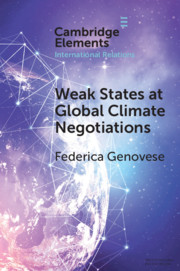Element contents
Weak States at Global Climate Negotiations
Published online by Cambridge University Press: 01 July 2020
Summary
- Type
- Element
- Information
- Online ISBN: 9781108800051Publisher: Cambridge University PressPrint publication: 30 July 2020
References
- 16
- Cited by

